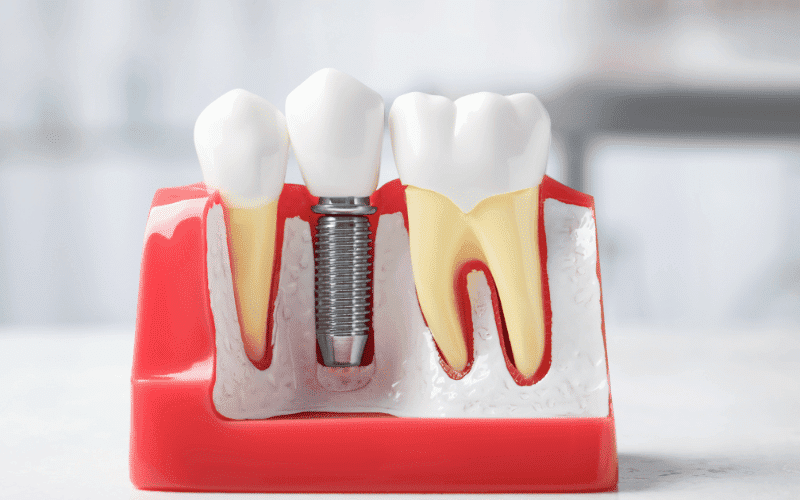Starting on the route to a brilliant smile with dental implants is an exciting adventure, but only some find the road perfectly paved. We dig into the subtle elements that drive this transformational choice as we unravel the enigma around dental implant candidature. Understanding who might not be an excellent candidate for dental implants reveals the core of this dental revolution, from the subtle dance of bone density to the influence of lifestyle choices.
Join us on a journey into oral health as we decipher the secrets of a brilliant smile and investigate alternate options for individuals seeking long-term confidence.
Exploring The Criteria:
While dental implants are a fantastic answer for many people, several circumstances may make people unsuitable candidates for this operation. Let us go into these aspects to have a thorough grasp.
1. Insufficient Bone Density:
Adequate bone density in the jaw is one of the major prerequisites for effective dental implantation. Implants are screwed into the jawbone and replicate the structure of natural teeth. Individuals with low bone density may not be able to support the implant.
In such circumstances, bone grafting operations to improve bone structure may be considered before contemplating implants.
2. Uncontrolled Medical Conditions:
Diabetes, immunological disorders, and cardiovascular problems can all have an impact on dental implants. Working with a dentist and a healthcare professional is critical to check health and reduce hazards.
It is recommended to postpone implant treatment until diabetes is under control. Inherent risk factors, such as drug responses or poor healing, should also be taken into account. Diabetes, Parkinson’s disease, autoimmune disorders, osteoporosis, bone degradation, poor psychological health, and systemic ailments should all be examined.
3. Gum Disease Presence:
Dental implants require healthy gums to function throughout time, but gum disease can weaken the tissues that support teeth, compromising the implant’s stability. Treating and managing gum disease is necessary to create a stable environment for implant implantation.
Whether you have periodontal disease, see a spring dentist to explore your options and see whether you are a good candidate for dental implants.
4. Smoking And Tobacco Use:
Smoking raises the likelihood of implant failure due to nicotine’s effect on blood flow and osseointegration, both of which are required for implant integration with bone. To maximize success, dentists suggest stopping smoking before and after implant treatments.
Smokers may still be candidates for dental implants if they stop smoking for a reasonable amount of time before and after surgery. The length of abstinence is determined by characteristics such as smoking history, frequency, and quantity.
5. Radiation Treatment:
Patients who are presently undergoing (or have previously had) radiation therapy to the face and neck are not good candidates for dental implants. Prior or ongoing radiation therapy increases the likelihood of implant failure by doubling or tripling it, albeit this impact is dependent on at least two significant conditions.
First, the location of your radiation therapy and the extent to which your jaw was exposed to radiation. The second factor is the amount of radiation utilized. Some studies have found that radiation exposure of 55 grams (Gy) may enhance a patient’s chance of implant failure. Assume you are or have been exposed to radiation.
In such a situation, your dentist will need to work closely with your oncologist to evaluate whether you should proceed with implant placement or how to reduce the chances of implant failure.
Alternative Solutions For Non-Ideal Candidates:
For those who may not be suitable a candidate for dental implants, some alternative solutions exist to restore oral functionality and aesthetics.
1. Dentures:
Traditional dentures are prosthetic prostheses that are removable and can be used to replace lost teeth. Dentures, while not as permanent as dental implants, are a cost-effective and feasible option for people who do not fit the criteria for implant surgery.
2. Dental Bridges:
Dental bridges are permanent prosthetic devices that fill the gap left by lost teeth. Bridges provide stability and cosmetic benefits when nearby natural teeth or dental implants are supported. They are a viable solution for people who have unique tooth loss patterns.
3. Mini Implants:
Mini implants may be an option when regular implants are not viable. These tiny implants are appropriate for those with low bone density and can be a feasible choice for denture stabilization.
Understanding one’s candidature for implants orchestrates a harmonic route toward a brilliant smile in the symphony of dental options. Alternatives await individuals who do not align with implant appropriateness, guaranteeing any smile is left in the shadows.
Accept the wisdom of educated judgments, consult dental experts like DNA Dental Studio, and chart the finest course for your requirements. Whether implanted or supported by alternatives, the goal is the same: a confident grin that exudes both health and happiness.
Your oral journey may differ, but the ultimate result is unmistakably a painting created with the brilliance of a revitalized, enduring smile.
Also, read our latest article: Tooth Extraction Demystified: Common Myths And Facts


